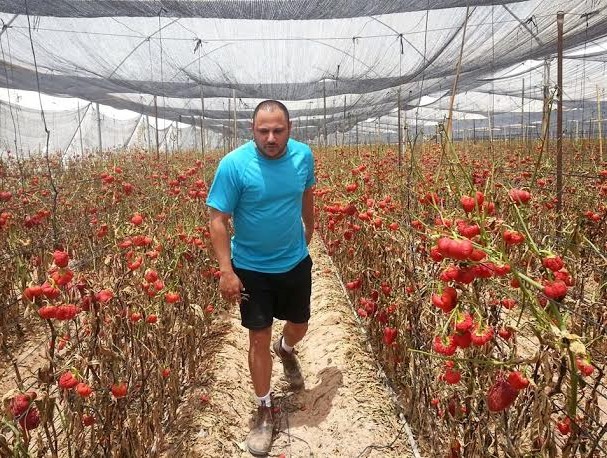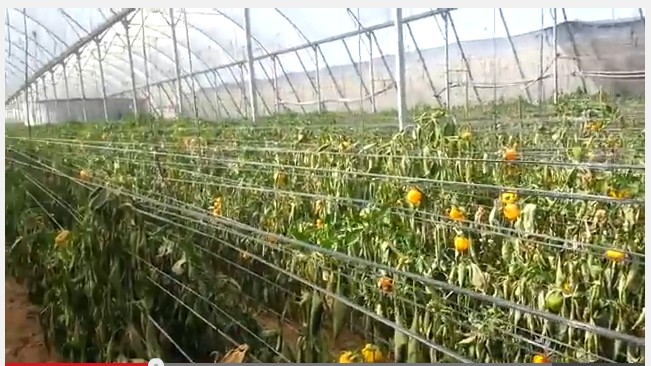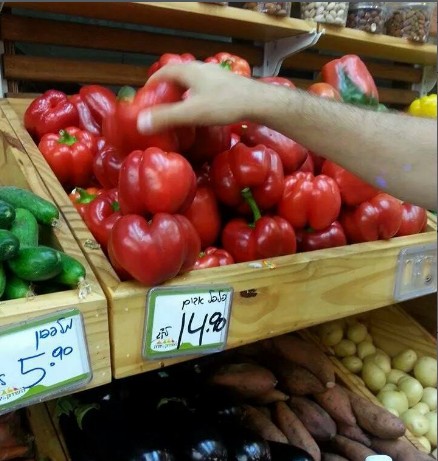Mass Destruction of Vegetables for No Reason: An Interview with a Suffering Farmer
Ever wondered why peppers are so expensive? It might not be due to a shortage but a manufactured crisis. In a revealing interview, farmer Barak Omega shares insights into a troubling agricultural practice.

The short video you're about to see was released by Barak Omega about five months ago, on the last day of April. He filmed it in a moment of pain that continues to this day and is only growing. Recently, it regained high virality, indicating its relevance now more than ever. In his painful video, massive destruction of peppers is shown without any apparent reason. In fact, there is a reason, and it is frustrating and infuriating. It is due to a bloated and aggressive elite that wants all our money, filled with personal interests, leaving everyone else to either eat their hats or destroy the peppers.
Read more:
Amazing Phenomenon in Gaza Sands
Rare Photos: Maran zt"l at the Crown Event of the Chief Rabbi of Tel Aviv
80 Agorot per Kilo of Pepper?
In an interview, Omega, a farmer living in the Arava, explains the crazy absurdity happening under our noses, about high-level wastefulness, and a needless process that could save us a lot of money and add more peppers to the salad. Due to an unclear monopoly filled with politics, wholesalers refuse to buy goods from farmers, forcing them to destroy it. As a result, consumers receive more expensive products while quality goods are discarded.
 Barak Omega. Frustrated with the situation
Barak Omega. Frustrated with the situation
"In the Arava, we rely on 95 percent exports," says Omega. "Every year we finish the growing season meant for abroad around the month of April and then focus on the local market. This year, exports closed early, already in the first week of Nisan. Then we received a notice from the wholesalers not to send goods to the local market".
 Growing peppers headed for destruction
Growing peppers headed for destructionAs farmers, Omega and his colleagues lack accurate information about fruit and vegetable prices in the market; they have had to rely on wholesalers – or rather, they relied until now. "We get updates after the fact on how much the peppers sold for, and based on that, we receive profit," he says. The conversations with wholesalers usually went like this: "There’s no price for the fruit; it’s not worth the money," they said. Still, Omega pressed, "How much are we getting?" "Maybe 80 agorot" – they responded.
"To pick the pepper, pack, and ship it, costs about 1.80 shekels per kilo. Let’s say between 1.50 and 1.80 shekels, depending on how much you put on the pallet, etc. So, if a wholesaler tells me I'll get 80 agorot per kilo, how can it be worth it when it costs me almost a shekel more? I was left with no choice but to leave the produce and market it or shut off the pipes. And don’t think just sending to the wholesaler is expensive; maintaining a field costs a farmer a thousand shekels a day".
"They said there's no price for peppers – so I shut off the pipes"
After many days of chasing wholesalers with identical responses, Omega decided to cut the water supply. "A week and a half after I cut the water, I went shopping in Eilat," Omega recalls. "I entered one of the chains and saw the cheapest peppers at 11.90. Honestly, I went into shock. I felt a true heartache. I called the wholesaler again, but he brushed me off with evasions: 'I don't know what you're talking about'. I returned frustrated and angry and decided to tell friends everywhere how the peppers are destroyed and why. That season I destroyed 70 tons of peppers – a loss of 300,000 shekels. And I'm not the only one. In the Arava, at least 4 to 6 tons of just peppers were destroyed.
I uploaded the video online, and it became viral. News outlets called me and said it received over a million views in 48 hours. I uploaded it at five in the afternoon; from nine onwards, just phone calls. I answered messages until three in the morning." We, the farmers, began moving from chain to chain, discovering the outrageous prices the consumer pays for peppers.
How did people respond to the video?
"With frustration and anger that I found hard to contain," Omega says quietly, breathing deeply. "People were in shock; the frustration overwhelmed them. How can the state allow such behavior? How is it possible to say there are no peppers and the price rises when so many tons of vegetables are destroyed in the Arava alone? This is a severe blow to consumers and, of course, farmers.
 Why is pepper expensive?
Why is pepper expensive?
Decisive Decision – Leaving Home and Business
Omega, a farmer since 2007, decided alongside his wife that they would leave the place. "You can't grow and lose. It's absurd," he says, with good reason.
"Around that time, I got a call from a woman in the north. She told me they have private farmland, passed down for 120 years. This year, they decided to shut down the business. They sold all the equipment quickly, and the business reached its end. 'Today there are more who don’t cultivate than those who do...'.
He had this conversation the same evening the final decision to leave was already sealed between him and his wife. "But after talking to that woman, I had a moment of realization. Suddenly, a strong thought crossed my mind that we can't ignore what's happening. If everyone closes down, everyone leaves, what will happen? I must not either. In the morning, I shared my new decision with my wife. To my great relief, she immediately supported me. We decided to sell our apartment in Beersheba and use the money to start a new pepper season."
Weren't you afraid of taking such a big risk?
"It’s a crazy fear, hard to even explain. Eight farms closed in the past two years in the Arava alone. But understand, the entire settlement initiative in the Arava hinges on agriculture. No agriculture – no residents. No residents – no homes, and then cousins will come..."
According to the law, in June everything must be uprooted in the Arava because of pests. At the end of July, planting begins, and produce should hit the market by late October. "We decided to fight, realizing we need to create a direct-to-consumer sales platform, at least to shake up the system. We banded together, colleagues from the industry, bypassing wholesalers. What can we do? When we approached the wholesalers, they told us the middlemen were to blame. The middlemen blamed the marketers, who blamed the retailers. I know one thing: there are consumers and farmers, and in the middle, there’s a bloated and aggressive elite. The consumer pays a hefty price while we're left with nothing – I don’t know where it goes."
It turns out the Ministry of Agriculture checked and concluded that if the price were lower, people would buy more. If the price is 13 shekels, people will buy the minimum if at all.
Omega heads the anonymous association, meeting with retail chains and the Ministry of Agriculture. "The hardest problem is despair," he says. "I decided not to despair, but people in the Arava are leaving – because they have no choice. The government doesn't lift a finger, even though various Knesset members have come, but we know salvation won't come from there".
We Are a Sort of Wallet for the Country
"We bring in a lot of money for the country directly and indirectly, but we’re treated like a wallet – that's how we're regarded. We have a share of the blame in this, even before I came," he admits, including himself with everyone else. "We lived in a way that attracted envy; economic prosperity is a taboo in Israel, and in the Arava, not everyone knew how to be humble. From this complacency, the farms and incomes began to decline. There was a boycott of Israeli produce; farmers started getting involved in other things like carton, and engaged in many other activities apart from agriculture. Today, they regret it."
Today, farmers in the Arava are trying to create some trust between themselves and the consumers, maybe to adapt the growing conditions more suited to Israel than abroad. "Our solution isn’t abroad, and not only because Spain exports four times more peppers than us. We live here and need to solve the situation here. I also understand retail chains need to profit, but you can't create such high brokerage gaps from the farmer to the consumer; it's absurd. We have a hard and extensive job ahead, but we believe we will do everything to reach some solution.
The Image of the Farmer Needs Improvement
Perhaps what hurts Omega the most, aside from the financial loss, is the disproportionate public image. "And in general, we need to create wise consumption here," he says. "Why do consumers keep buying a product when its price is so disproportionate?"
"Most chains buy four basic products like onion, potato, cucumber, and tomato – they buy them expensively and lose on them, but the moment they lose, they demand the farmer lower the price, creating pressure that's not his fault. The chain's head says if these vegetables lose – fruits will cover them, or pepper, which is considered a premium product for no reason. The consumer doesn't buy it in quantities due to price."
The consumer is unaware of the trading that's been going on since the farmer releases the goods. "In the Israeli market, there are two companies dealing with number crunching in the sector: Eurocom – shows the price the wholesaler sells to the retailer, and the Plant Council – releases data of how much the wholesaler pays to the farmer. Two pricing lists are created, and as known, Eurocom provides a more realistic price than the Plant Council, which, according to people, and I don't intend to delve into it, inflates prices for self-interest reasons. There's a minimum and maximum price of a certain fruit in the price list. Suppose it's listed between 4-5 shekels per kilo. The chain comes and says I'm willing to give you the price list, but 30 percent less. It turns out that instead of four shekels, which is the minimum, the farmer receives 2.7 shekels. Packaging is also at the farmer's expense, which is another 25 agorot, and transportation 45 agorot, leaving the farmer with less than a shekel per kilo. The consumer is unaware of this at all and directs anger at the farmers – unjustly, as the blame should be directed elsewhere, where they sit and rake in profits without interruption. Meanwhile, consumers will continue to pay a lot of money, and we, the farmers, will pray we won't have to face another unneeded mass destruction of such good fruits and vegetables."

